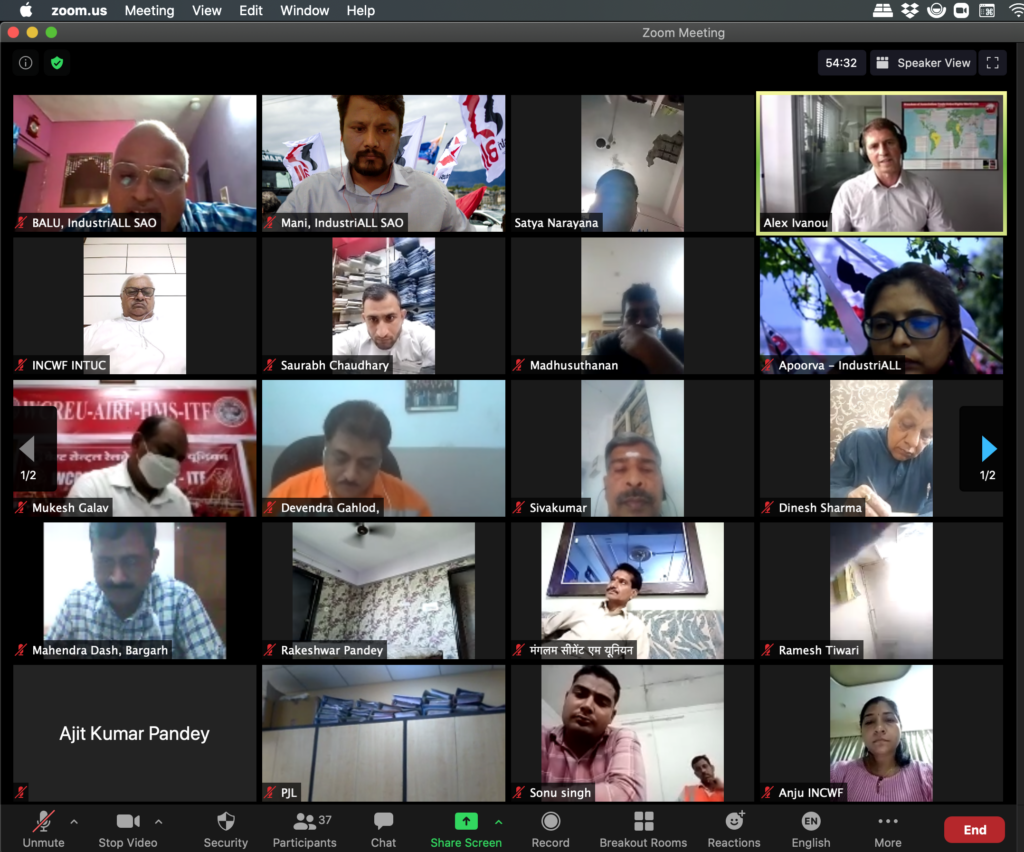Read this article in:
English
24 September, 2020The Covid-19 pandemic has exacerbated challenges for Indian cement workers, including mounting job losses, the threat of infection at work, lack of medical support and a race to bottom with the intensification of precarious work.
Over thirty cement sector union leaders from across India, representing workers in multinational corporations and Indian cement manufacturing companies, took part in a virtual meeting organized by IndustriALL South Asia office on 21 September. They took stock of the Covid-19 impact on the world of work and possible trade union strategies to address the challenges.
Unions reported that as production resumed after the lockdown, employers reduced their workforce by laying off a large number of contract workers after years of service. They subsequently recruited new contract workers who have less experience for lower wages. Employers are operating with a reduced workforce and have almost reached pre-Covid-19 production levels, leading to an increased workload.
Deoraj Singh of Indian National Cement Workers Federation, said,
“the employers should not trigger the race to bottom with various anti-worker strategies including non-payment of wages and benefits, partial payments and lack of medical support to Covid-19 infected workers. Interests of the contract workers must be protected.
“Using Covid-19 as an excuse, many cement factories across the country did not pay wages to the contract workers during the lockdown period. Unions had to struggle approaching respective labour commissioners to ensure payments, however, at many instances state apathy and employer’s indifference resulted in non-payment. Many of them were migrant workers and had to walk days together to reach their hometowns.”
Mukesh Galav, of All India Cement Employees Federation said,
“If the current trend of contract workers system continues, there will be no permanent workers in the cement sector. Trade unions in the cement sector need to forge unity and take united actions to find solutions to various problems of cement workers.”
Alexander Ivanou, IndustriALL Materials Industries and Communications Officer, said,
“It is shocking to note that, on the pretext of pandemic many cement companies have almost stopped recruiting permanent workers. It is unfair, that they also faltered on the initiatives to improve gender balance among cement workers by increasing training period of women workers whose services were supposed to be regularized.”
“While many multinationals have tall claims on their health and safety records, in reality, many precarious workers face an unsafe working environment. To contribute to sustainable development, the cement industry in India needs to increase its permanent workforce, improve health and safety, provide Covid-19 support to workers, and equal opportunities and gender balance among the workforce.”
The meeting also highlighted various aspects of improving health safety measures and union strategies to shield workers from Covid-19 at the workplace. At the end of the meeting the participants agreed on a plan of action to properly address the challenges workers confront in the cement industry in India. This includes the launch of a questionnaire, with the assistance of IndustriALL, to assess the current situation in the cement industry, as well as joint action to limit the use of precarious work and promote health and safety at work.
